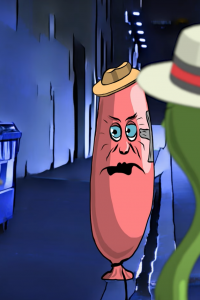Heaven Off Earth: A Review of Elysium
 by Gary Westfahl
by Gary WestfahlBlomkamp departs from tradition more provocatively in the way that he characterizes the residents of his space habitat and their motives; indeed, knowingly or not, he is offering a devastating critique of the entire literature of space habitats. In those stories, almost invariably, the people in the space habitats are the heroes, not the villains; they are the ones who were smart and savvy enough to recognize that the planet Earth is doomed, hopelessly afflicted by diminishing resources and oppressive bureaucracies, and they are the ones who were courageous and clever enough to find a way to escape from the misery of life on Earth to find prosperity and freedom in space. Then, as they forge their libertarian paradises deep in space, they express nothing but contempt for the people they left behind, disparaging them with insulting names like “groundpounders,” “earthworms,” “groundhogs,” and “mudeaters.” Nobody needs to care about them because they are evolution’s losers, the people who weren’t intelligent enough to get away from Earth and hence properly destined to die. Blomkamp’s film exposes the utter vacuity and immorality of these arguments. In the first place, it is senseless to argue that all the people who will venture into space are smart and virtuous, while all who will choose to stay behind are stupid and venal; as I have pointed out elsewhere, this is a logic that would make Hernando Cortes a visionary and Isaac Newton a dullard. Here, Matt Damon’s Max De Costa is manifestly a better person in all respects than Jodie Foster’s Defense Secretary Delacourt, even if the circumstances of his life did not provide him with a passport to space. Second, even if space travel will eventually function as some sort of imperfect winnowing device for the human race, that doesn’t mean it is appropriate to ignore the plight of individuals who don’t measure up; does any just society provide assistance only to the people who pass an intelligence test? Elysium criticizes the inhabitants of its space station not because they are privileged, but because they are doing absolutely nothing to help the people on Earth even though they have the ability to do so. In sum, I’m sure that Blomkamp was not intending to spit in the face of all the writers of those space habitat stories, but that is effectively what he has done.
Blomkamp’s film also exposes another flaw in those stories. The standard purpose of space travel in science fiction has always been, you know, “to explore strange, new worlds; to seek out new life, and new civilizations,” and so on. Yet the people building these space habitats, for the most part, were primarily interested in settling into a new, improved version of the planet Earth where they would never have to encounter anything surprising or disturbing. There is an almost stultifying domesticity in the space habitats of stories like Elizabeth Moon’s “Welcome to Wheel Days” (1989), which appears to argue that we must travel into space in order to re-create the lifestyle of nineteenth-century rural America. Elysium is more upscale – a succession of mansions surrounded by well-manicured grounds recalling the aristocratic homes of the 1920s – but it is also a version of humanity’s past, and none of its residents are interested in leaving their stately homes in Earth orbit to further explore outer space. And this is why they, and the other inhabitants of space habitats, are actually the people who are decadent and doomed; they are avoiding the challenge of confronting Earth’s problems in order to retreat into their past, while people still on Earth like Max De Costa, after a lifetime of struggling to survive in the present, are better prepared to prevail. This is the true meaning behind the name of Blomkamp’s space habitat, the ancient Greek heaven for the blessed; for the residents of Elysium are passive and spiritually dead, while De Costa and his compatriots are active and alive. Thus, Delacourt has a point when she complains that “this habitat is dying,” even though her proposed solution – oppressing Earth’s people even more brutally – is not exactly optimal.
The inevitable ending of such a film is that the pampered elites of Elysium receive their comeuppance and the suffering masses of Earth get a better deal; yet one aspect of its conclusion is unusual and depressing, perhaps something that Blomkamp had to fight for in heated arguments with his financial backers: “But Neil, you’re screwing up your chance to make Elysium 2!” Avoiding the possibility of a sequel, however, may have been a wise decision. Of course, one could mechanically repeat the same story, as someone like Delacourt gains control of Elysium and brings back the bad old days, requiring someone like De Costa to defeat another villainous overlord; but it is harder to see how one might genuinely advance its story. For sharing the wealth of Elysium may temporarily improve the lives of Earth’s people, but this clearly will not solve all the problems on this overpopulated, polluted planet. Science fiction has long promoted one attractive solution: to exploit the limitless resources of space. But this would require astronauts to mine the asteroids, hurl chunks of the Moon toward the Earth, and figure out how to grow crops on Mars; in short, it will require astronauts to wear spacesuits. But Hollywood has long been reluctant to tell stories about people in spacesuits, as I discussed after another research project involving a film subgenre which this film is not a part of: the spacesuit film. As best I can remember, nobody in this film wears a spacesuit – and why should they? Whenever they travel into space, like the people in all incarnations of Star Trek, all they do is move from one Earthlike environment into another Earthlike environment. Max De Costa and his streetwise friends are tough and resourceful enough to put on spacesuits and confront the realities of outer space, but no studio executive would greenlight that script; instead, they liked the idea of De Costa and a loathsome scoundrel named Kruger (Sharlto Copley) putting on exoskeletons so they could punch each other out like superheroes.
Such an envisioned conquest of space would further conflict with another of the film’s buried messages, also observed in the animated film Wall·E (review here). The films share certain similarities: in both, people go to live in a space station, enjoy the constant assistance of robots, and become complacent and decadent. In Elysium, even before De Costa’s final assault, it seems that the habitat is regularly invaded by refugees from Earth, who easily breach its defenses, and at the end of the film the station’s citizens are destined to be dominated by the newly empowered individuals who were once their underlings. The lesson in both films could not be clearer: living in space makes people weak, while living on Earth makes people strong. Thus, another unpalatable sequel to Elysium might involve everyone abandoning the space habitat in order to focus their energies on making Earth resemble Elysium, vibrant and verdant again, a tedious process which Wall·E hurries through with a series of still images. One difference between the films, though, is that Elysium offers no hope of robots becoming humanity’s partners or successors in either exploring space or revitalizing the Earth, since its robots seem incapable of developing genuine personalities; they all seem to be mindless thugs or, like De Costa’s “parole officer,” cartoonish dummies.
Elysium is in dialogue with other recent films in depicting a future world of desperate poverty, forcing people back into lifestyles recalling the early part of the twentieth century, although its background is more thoroughly and intelligently developed. So, while everyday citizens have indeed been forced to abandon modern devices that we take for granted (like clothes dryers, evidently uncommon since we observe clothes hanging on a clotheslines), they have not entirely lost touch with advanced technology, although it mostly seems to be in the hands of criminals. Interestingly, other films featuring bleak futures sometimes like to convey the intelligence of their heroes by making them inveterate readers of books, but Elysium more reasonably predicts that, in a society of depleted resources still serviced by effective machines, more and more people, like protagonist De Costa, might grow up to be completely illiterate. A few things in the film don’t make much sense: as in the reboot of Total Recall (2012) (review here), the hero makes his living working in a factory that manufactures robots, when this is a task that manifestly would be better handled by robots themselves; it seems very unlikely that the president of his company, John Carlyle (William Fichtner), would have the programming skills to personally prepare, in a very short period of time, a complete reprogramming of all systems on Elysium; and the humble home of De Costa’s childhood friend, nurse Frey (Alice Braga, trapped as in I Am Legend [2007; review here] in a thankless role as a single mother and not-quite-girlfriend to an action hero), is suspiciously well equipped to provide medical treatment to a badly wounded De Costa. Yet all of these infelicities can be tolerated, as they are necessary to keep the generally involving plot in motion.
Harder to tolerate is the way, already mentioned, that the plot eventually takes a turn for the worse, making Elysium seem like two separate films crudely edited together. The filming undoubtedly did not unfold in this manner, but one might suspect that it was shot in sequence, and about halfway through an executive watched the dailies and told Blomkamp, “There’s not nearly enough action in this film.” And, as if in response to his worries, the film suddenly becomes just like every other action film you have seen this summer, one pyrotechnic battle after another with all of the usual bells and whistles. The only difference is that, with an R rating, the film’s violence is much bloodier and more vicious, so much so that one begins to suspect De Costa is a closet masochist, deliberately choosing the courses of action that are most likely to cause him extreme pain. Perhaps, though, this is just one of Blomkamp’s quirks, since similar complaints were made about the last part of District 9; this does mean, though, that some viewers like myself will be attentive during the first hour and looking at their watches during the second hour, while others will mostly spend the first hour checking their text messages while waiting for the thrill ride to begin.
One secret irony in Elysium, in light of its scattered references to undocumented workers, is that it was filmed entirely in Mexico and Canada, the two nations where most of these unsanctioned sojourners must begin their journeys. Perhaps its sympathies for those longing to live in America are a reflection of its American actors and technicians constantly looking north or south, wishing that the economics of today’s industry would allow them to labor in their native country. This may also explain why the two foreign languages spoken in this film are French (briefly overheard in the wealthy Elysium) and Spanish (the language of De Costa’s impoverished Los Angeles).
One other ironic aspect of the film will not be appreciated in Hollywood: if Elysium has anything to say at all about the world of 2013, it is that you should never judge people by how much money they make, for its plutocrats are generally evil and its paupers are generally sympathetic. Yet this is precisely, and solely, how Elysium itself is going to be judged; throughout the weekend, in both company boardrooms and the popular media, the central topic will not be whether Elysium is a good film, but whether it is going to earn enough money to justify its relatively modest 100 million dollar budget. This shouldn’t matter so much to so many people, but such concerns, for better or worse, now dominate our perceptions of both heaven and Earth.








“Harder to tolerate is the way, already mentioned, that the plot eventually takes a turn for the worse, making Elysium seem like two separate films crudely edited together.”
Similar aspects of “two films crudely edited together” can be found in District 9, which breaks along the same lines: expository/social commentary/getting to know you in the first half of the film, action (explosions and big guns) in the second half. Two films does not make a pattern, but it does suggest one.
“Apparently, we are asked to believe that the centrifugal force generated by the rotating torus could not only provide artificial gravity for people and structures, but hold a breathable atmosphere as well; or perhaps, the atmosphere is being retained by some sort of magnetic field, circulation system, or oxygen-generating machine. Only a scientist could say if something like this would actually work, but since I cannot recall any science fiction story or science article proposing the idea, I strongly suspect that it would be impossible.”
As far as science fiction stories are concerned, if I remember correctly, the concept of holding a breathable atmosphere in plance in this manner was in fact proposed in Larry Niven’s “Ringworld.”
Nice review overall.